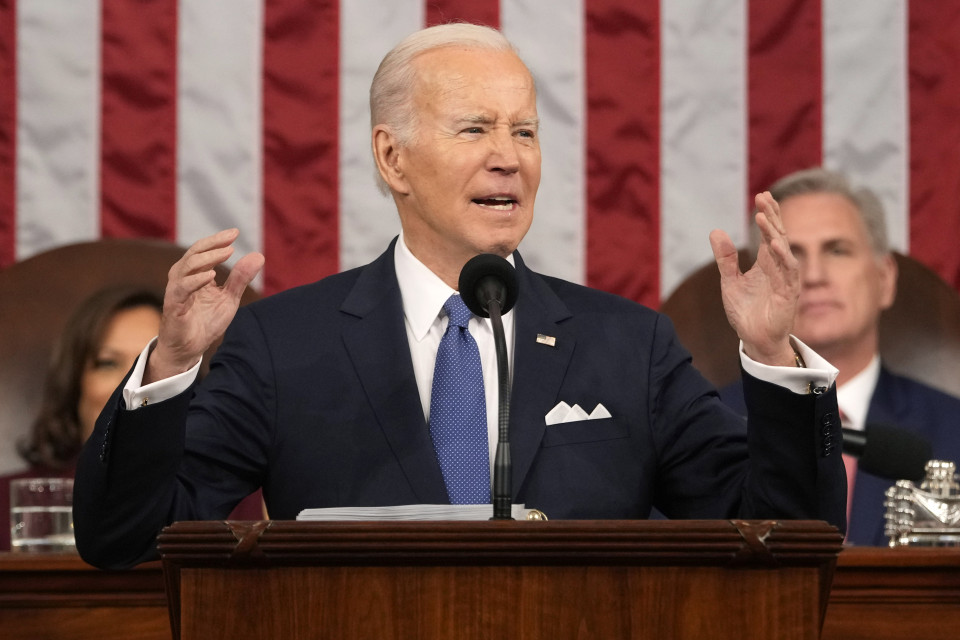U.S. President Joe Biden said Tuesday he is open to working with China, seeking "competition, not conflict," but that Washington will take action if Beijing threatens its national security.
In his second State of the Union address, Biden sought to draw attention to his economic achievements and did not hide his country's rivalry with China, emphasizing that during his presidency, more efforts have been devoted to protecting advanced technologies and modernizing the military.
"I am committed to work with China where it can advance American interests and benefit the world," Biden said. "But make no mistake about it, as we made clear last week, if China threatens our sovereignty, we will act to protect our country."

The annual speech to a joint session of Congress came as Biden prepares for the 2024 election and on the back of renewed tensions with China after the military on Saturday shot down what is believed to be a Chinese spy balloon that flew over "sensitive sites" in the United States.
With Democrats and Republicans in Congress pushing Biden to be tough on China, he said, "Winning the competition with China should unite all of us. We face serious challenges across the world."
"But in the past two years, democracies have become stronger, not weaker. Autocracies have grown weaker, not stronger," he said, adding that the United States has been stepping up cooperation and investing more with its allies to that end.
"Bridges are forming between partners in the Pacific and those in the Atlantic," he said. "Those who bet against America are learning just how wrong they are."
Chinese Foreign Ministry spokeswoman Mao Ning said Wednesday that Beijing "does not shy away from" competition with the United States, expressing opposition to "slandering, smearing and restricting the legitimate development" of other countries in the name of competition.
"The United States should establish an objective and rational understanding of China, pursue a positive and pragmatic policy toward China and work together to push bilateral relations back to the track of sound and stable development," Mao said at a press conference in Beijing.
The U.S. Defense Department said Tuesday that after the balloon incident, China turned down a request for a phone call between Defense Secretary Lloyd Austin and Chinese Defense Minister Wei Fenghe.
The discovery of the large maneuverable high-altitude balloon led to the postponement of a trip by Secretary of State Antony Blinken to Beijing, which would have been a follow-up to Biden's first summit with Chinese President Xi Jinping in November.
Blinken had hoped to rebuild bilateral ties, but the presence of the balloon, first disclosed by Washington on Thursday, has made relations tenser. Beijing insisted it was a civilian weather research balloon that had been blown off course.
On Russia's war in Ukraine, Biden reaffirmed Washington's continued support for Kyiv alongside its allies and like-minded countries.
Last year's speech was delivered just days after Russia's invasion started, with Biden calling it "totally unprovoked" and issuing a strong warning to Russian President Vladimir Putin that he would pay a high price for the aggression.
One year later, Biden said the United States, through its support for Ukraine, has contributed to helping people live free from tyranny and defending sovereignty, as well as democracy.
"We united NATO and built a global coalition. We stood against Putin's aggression," he said.
As with his first speech, Biden did not refer to North Korea despite it having test-fired around 70 ballistic missiles in 2022, the most in a single year.
The nationally televised evening speech was given as Biden faces a changed political environment compared to when he took office in January 2021, with the House now controlled by Republicans after they won a narrow majority in November's midterm elections. A probe launched into his handling of classified documents from his time as vice president has also proven a distraction.
With the third year of his term having begun in a new era of divided government, the 80-year-old Democratic president spent a large portion of his roughly one-hour speech not just listing his accomplishments and laying out his policy priorities but also calling for bipartisan cooperation on key domestic issues.
"To my Republican friends, if we could work together in the last Congress, there is no reason we can't work together in this new Congress," he said. "The people sent us a clear message. Fighting for the sake of fighting, power for the sake of power, conflict for the sake of conflict, gets us nowhere."
With his approval ratings now flagging at around 40 percent, Biden underscored his administration's success in bringing the economy back from the COVID-19 pandemic and making progress on regenerating growth from "the bottom up and middle out" rather than the top down.
Biden cited positive trends, such as rising wages, the nation's unemployment rate falling to an almost 54-year-low at 3.4 percent in January and the creation of 12 million jobs during his presidency.
He urged Congress to work together to reconstruct "the backbone of America -- the middle class -- to unite the country," noting that "we have been sent here to finish the job."
Related coverage:
Blinken puts off China trip after spy balloon detected over U.S.
U.S. opens embassy in Solomon Islands to counter China's influence
Germany, U.S. to give battle tanks to Ukraine

 By Takuya Karube,
By Takuya Karube,








